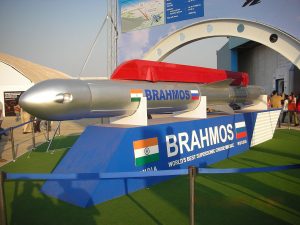Indonesia could soon become the second Southeast Asian nation to order the potent Indian-Russian BrahMos supersonic cruise missile, according to an Indian media report. India’s FinancialExpress.com reported on July 19 that Indonesia was in the final stages of talks for the possible order of the shore-based anti-ship variant of the BrahMos weapons system.
“Talks with Indonesia are in advanced stage for the export of the Indo-Russian BrahMos supersonic cruise missile,” the report cited one source as saying. “The deal could have been signed earlier, however, due to internal matters of that country, by year end, or early next year the deal is expected to be sealed.”
The BrahMos missile, which has been developed by BrahMos Aerospace, a joint venture between India and Russia that was set up in India in 1998, is the world’s fastest supersonic cruise missile. It can be launched from submarines, ships, aircraft, or from land platforms, and flies at nearly three times the speed of sound, making it nearly impossible for targets to evade.
These capabilities have made it highly attractive to Southeast Asian nations that seek to defend large and dispersed maritime domains, particularly from Chinese incursions. In January, the Philippines officially closed a $374 million deal to acquire the BrahMos weapons system, strengthening its navy’s ability to safeguard its sovereign claims in the South China Sea.
While the Armed Forces of the Philippines opted for the shore-based anti-ship variant, Indonesia is reportedly hoping to fit the missile onboard its warships. According to FinancialExpress.com, a team from BrahMos has already visited an Indonesian shipyard to study the possibility of installing the missile.
The purchase, should it proceed according to the timeline proposed by the Indian media report, would represent a fillip for New Delhi’s Act East policy, which seeks to deepen its economic and strategic ties to Southeast Asia. A second BrahMos sale to the region would consolidate India’s status as the region’s second significant player in the supersonic missile game, after Russia.
Indonesia has had a confirmed interest in purchasing the Indo-Russian system since at least 2018, while Thailand, Malaysia, and Vietnam have also shown interest in acquiring BrahMos missiles. Indeed, with Russia’s reputation as an arms supplier of first resort thrown into uncertainty by the ongoing aggression in Ukraine, India has an opportunity even to establish itself as the region’s partner of choice.
The sale would also frank the growing strategic partnership between New Delhi and Jakarta, the core of which focuses on maritime security and defense cooperation. Two of the primary anchors of maritime Asia, the two nations share a concern about China’s growing power and assertiveness, and a commitment to maintaining a non-aligned and staunchly independent foreign policy.
As Don McLean Gill noted in these pages last year, India and Indonesia have historically tended to focus inward at the expense of outward power projection, but this is changing quickly in an era of resurgent Chinese power. In 2018, India and Indonesia established a comprehensive strategic partnership and held for the first time a bilateral naval exercise known as the Samudera Shakti.
For Indonesia, the benefits of acquiring this powerful new weapons system are not hard to discern. While the country’s navy has operated the ship-based Russian-origin Yakhont supersonic anti-ship cruise missile since 2011, the purchase of the more advanced BrahMos system would represent a significant upgrade to its maritime deterrent capability in the waters around the Natuna islands, which overlap with China’s expansive “nine-dash line” claim, and which over the past decade have seen repeated incursions by Chinese fishing boats and maritime militia vessels.
Above all, the purchase, which could see other Southeast Asian nations move in Indonesia’s footsteps, would be yet another sign of the regional arms buying spree that has been prompted by China’s maritime assertiveness.

































